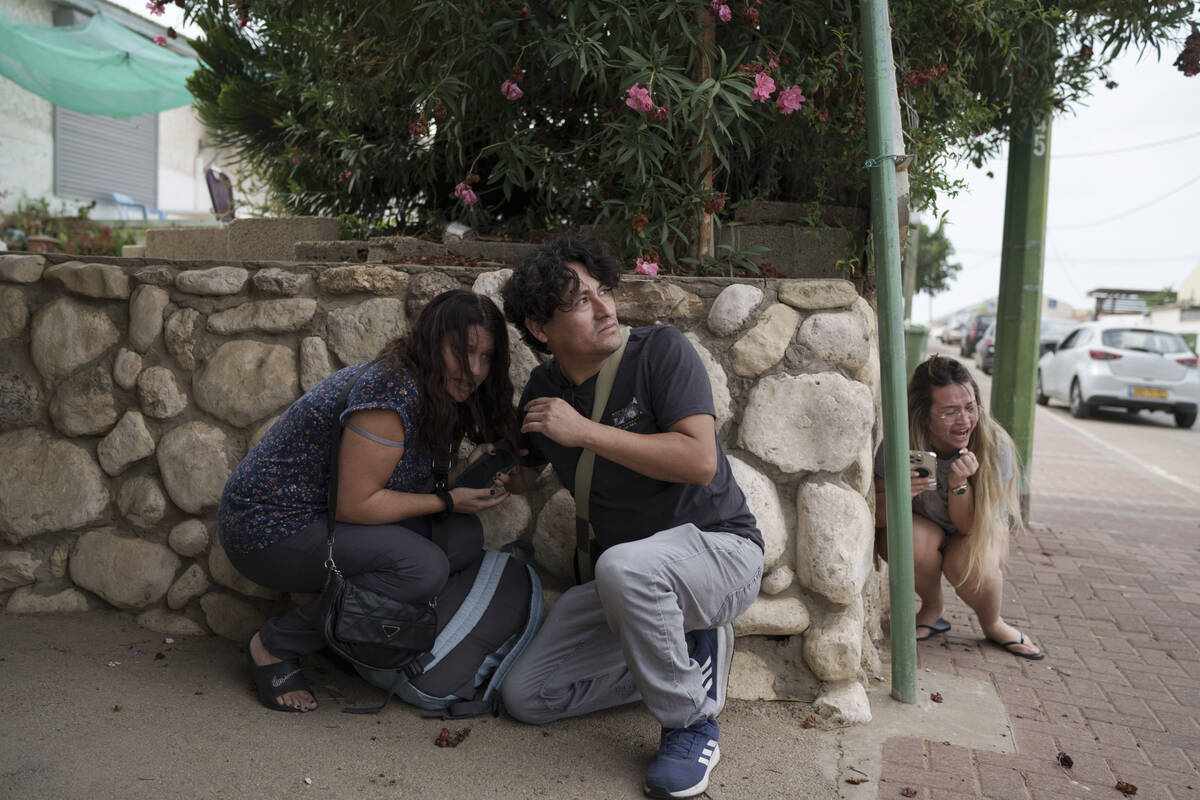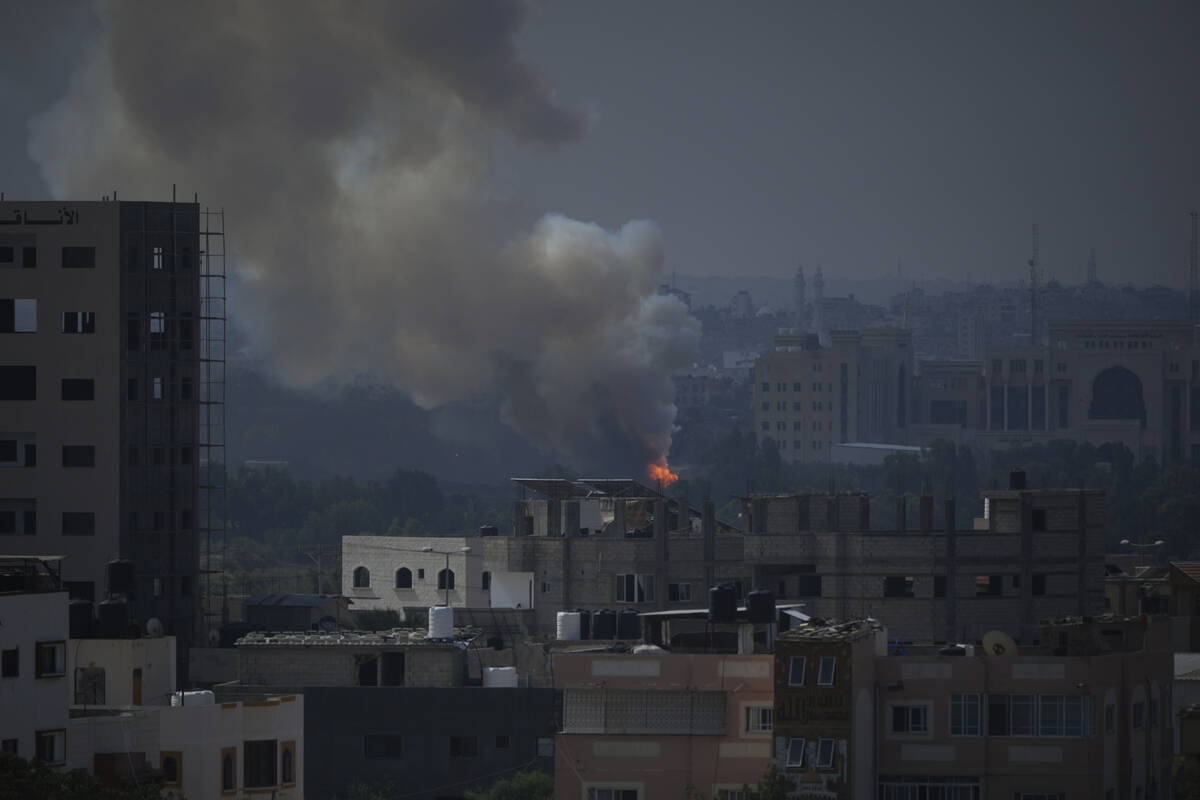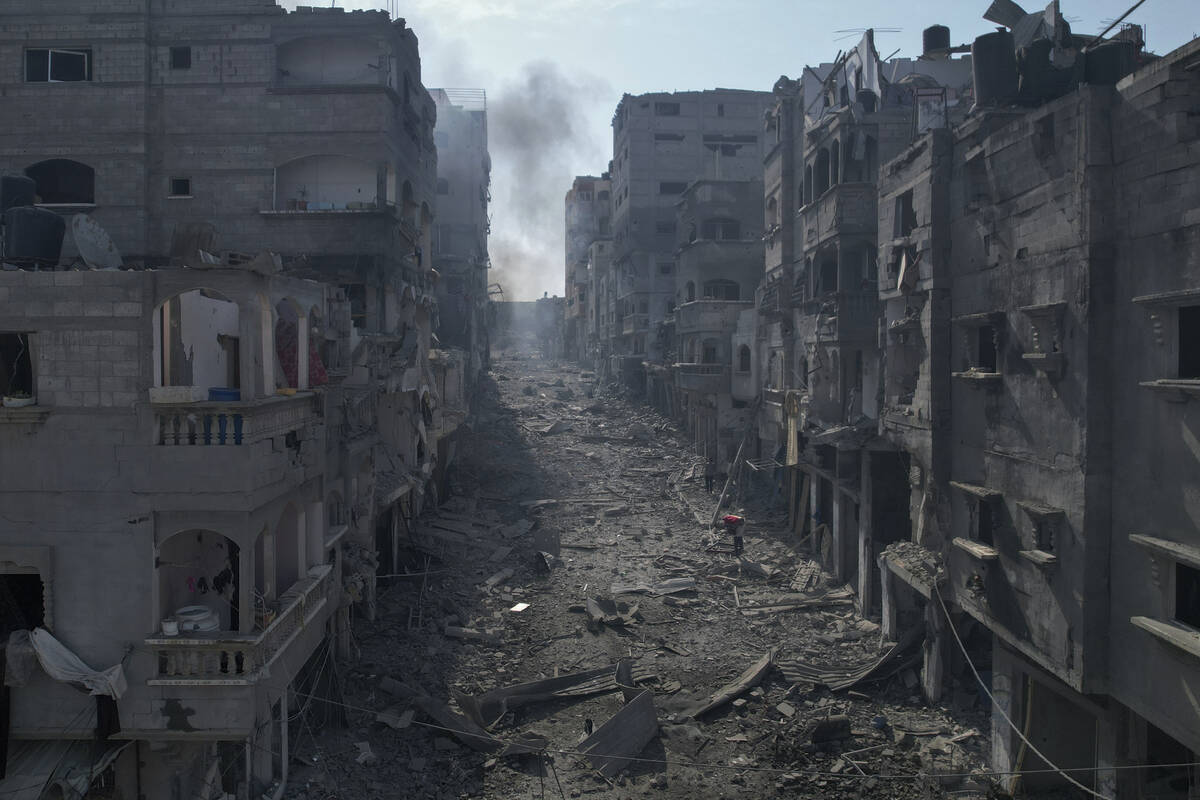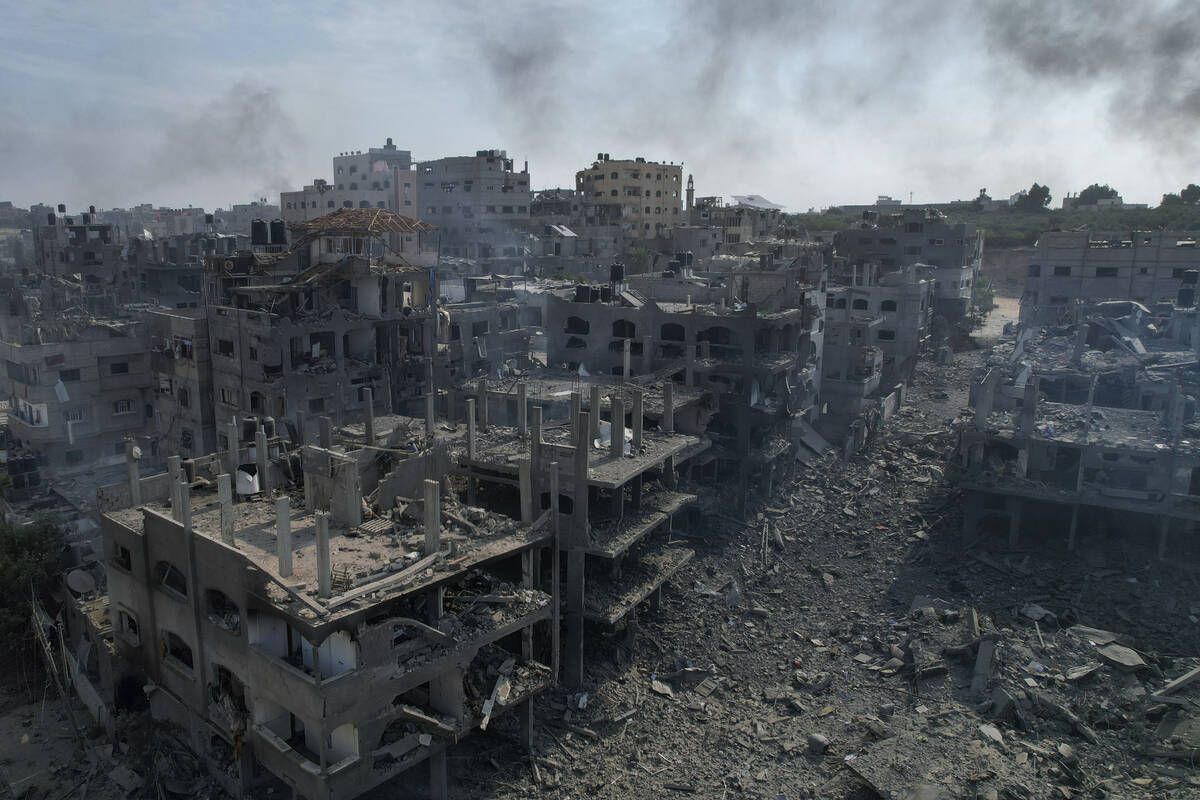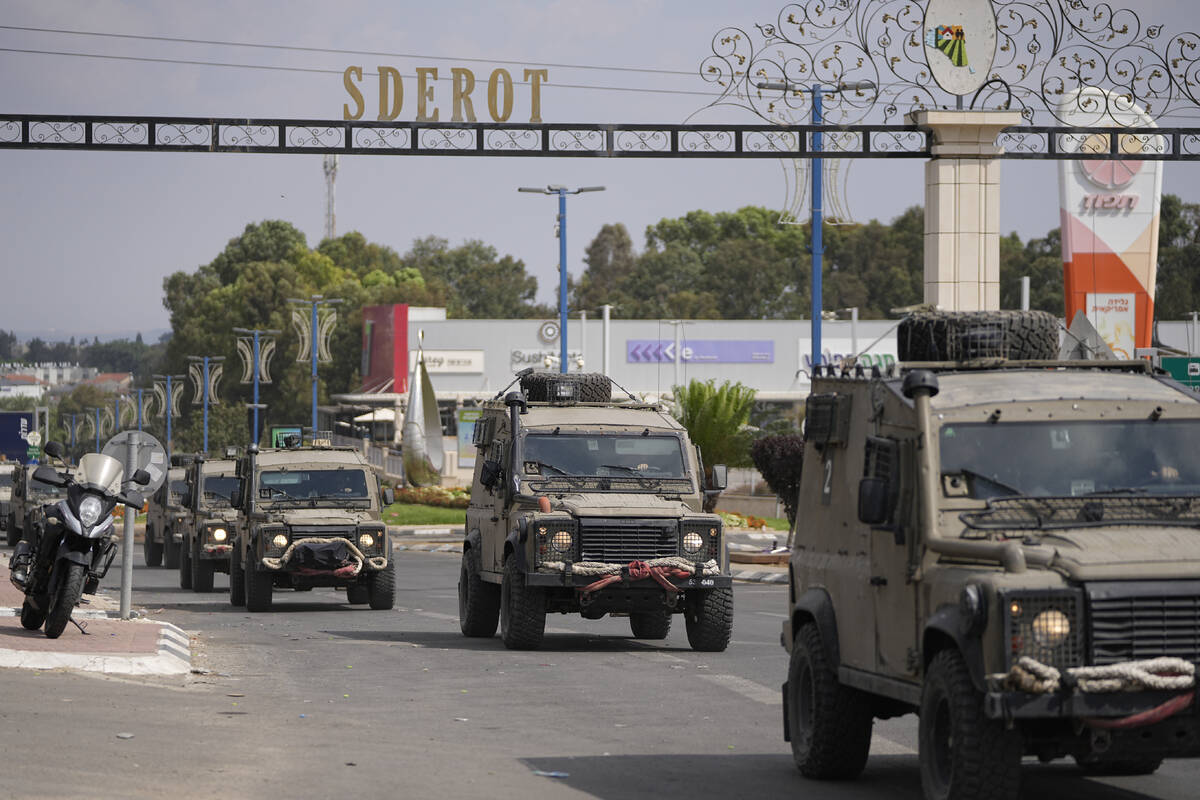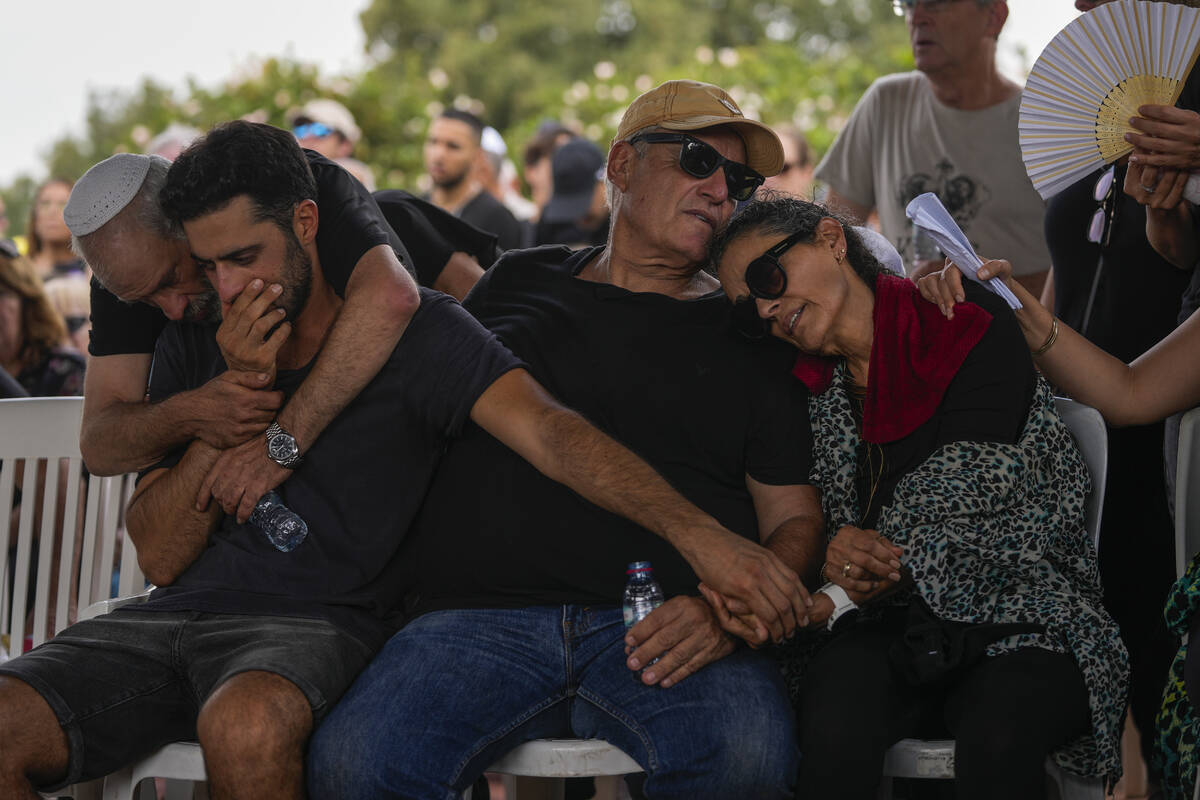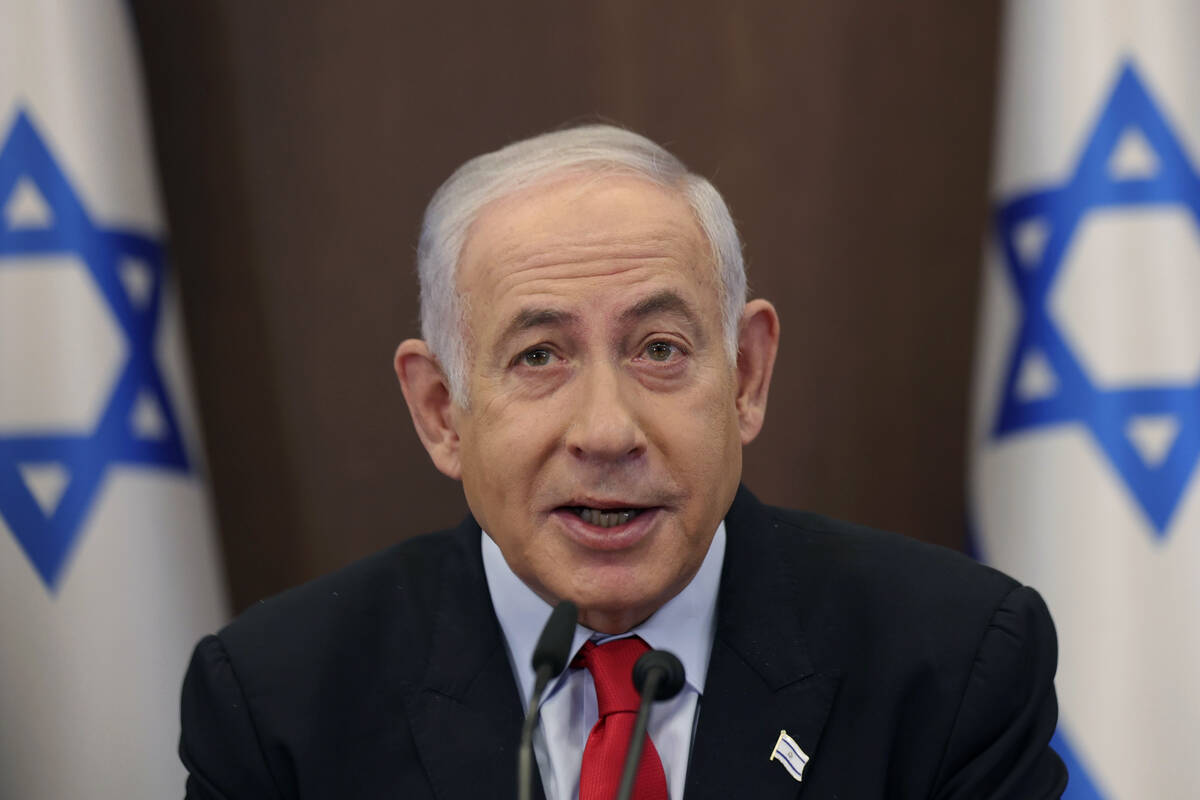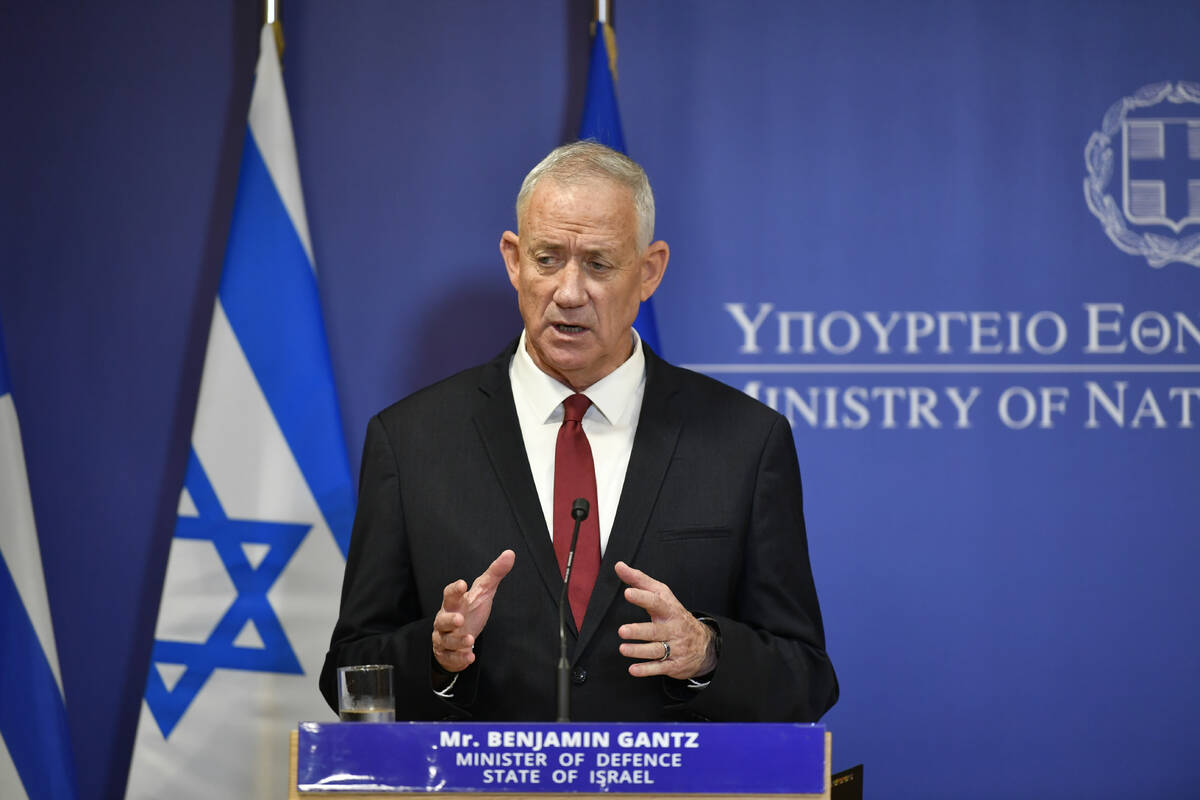Israeli military readies for ground assault, but no decision has been made
JERUSALEM — The Israeli military says it is preparing for a possible ground operation in Gaza but that the nation’s political leaders have not yet decided on one. Lt. Col. Richard Hecht told reporters Thursday that forces “are preparing for a ground maneuver if decided.”
Israel has called up some 360,000 army reservists and has threated an unprecedented response to Hamas’ bloody, wide-ranging incursion over the weekend. It has been launching intense airstrikes on Gaza since the attack Saturday, as militants have fired thousands of rockets into Israel.
Palestinians in Gaza spent the night in pitch darkness, surrounded by the ruins of pulverized neighborhoods, as Israeli Prime Minister Benjamin Netanyahu vowed to “crush and destroy” Hamas, with the support of a new war cabinet that includes a longtime opposition critic.
“Every Hamas member is a dead man,” Netanyahu said in a televised address.
International aid groups warned that deaths in Gaza could accelerate as the territory runs out of supplies amid an Israeli blockade. The war, which was ignited by a bloody and wide-ranging Hamas attack into Israel, has already claimed at least 2,400 lives on both sides.
The Israeli military said overnight strikes targeted Hamas’ elite Nukhba forces, including command centers used by the fighters who attacked Israel on Saturday, and the home of a senior Hamas naval operative that it said was used to store unspecified weapons.
“Right now we are focused on taking out their senior leadership,” Hecht said. “Not only the military leadership, but also the governmental leadership, all the way up to (top Hamas leader Yehiyeh) Sinwar. They were directly connected.”
22 Americans dead
Meanwhile in Washington, the State Department said the number of U.S. citizens confirmed to have been killed in the war has risen to at least 22, with at least 17 unaccounted for. That’s an increase in the death toll from 14 the day before.
U.S. citizens are among the estimated 150 hostages captured by Hamas during their weekend assault on Israel, President Joe Biden confirmed on Tuesday.
Biden said he and Vice President Kamala Harris spoke by phone on Wednesday with Netanyahu. It was at least the fourth call between Biden and Netanyahu since Saturday’s attack.
“The United States has Israel’s back and we’re going to be working on this through the day and beyond,” Biden said.
Threat to kill hostages
The Hamas-run Interior Ministry said Israeli strikes demolished two multi-story houses on top of residents without warning, killing and wounding “a large number” of people, mainly civilians. Hamas has threatened to kill Israeli hostages if Israel strikes Palestinian civilians without warning.
Israel has halted the entry of food, water, fuel and medicine into the territory. On Tuesday, Gaza’s only power station ran out of fuel and shut down, leaving only lights powered by scattered private generators. Those will shut off as well if fuel is not allowed in.
A senior official with the the International Committee of the Red Cross warned that lack of electricity could cripple hospitals, as he called for Hamas to release hostages.
“As Gaza loses power, hospitals lose power, putting newborns in incubators and elderly patients on oxygen at risk. Kidney dialysis stops, and X-rays can’t be taken,” said Fabrizio Carboni, ICRC’s regional director. “Without electricity, hospitals risk turning into morgues.”
In Israel, opposition leader Benny Gantz, a former defense minister and political opponent of Netanyahu, joined a new wartime cabinet at a time when the Israeli military appears increasingly likely to launch a ground offensive into Gaza. Israel has mobilized 360,000 reservists, massed additional forces near Gaza and evacuated tens of thousands of residents from nearby communities.
The Israeli government is under intense public pressure to topple Hamas after its militants stormed through a border fence Saturday and massacred hundreds of Israelis in their homes, on the streets and at an outdoor music festival.
Atrocities detailed
Netanyahu alleged that the attackers engaged in atrocities, including binding boys and girls and shooting them in the head, burning people alive, raping women and beheading soldiers.
The prime minister’s allegations could not be independently confirmed, and authorities did not immediately offer further details. Rescue workers and witnesses have described horrifying scenes, including the slaughter of elderly people and finding bloody rooms crowded with massacred civilians.
Militants in Gaza are holding an estimated 150 people taken hostage from Israel — soldiers, men, women, children and older adults — and they have fired thousands of rockets into Israel over the past five days.
Israel’s increasingly destructive airstrikes in Gaza have flattened entire city blocks and left unknown numbers of bodies beneath debris. A ground offensive in Gaza, whose 2.3 million residents are densely packed into a strip of land only 40 kilometers (25 miles) long, would likely result in a surge of casualties on both sides.
339K displaced by bombing campaign
The UN said late Wednesday the number of people displaced by the airstrikes had soared 30 percent within 24 hours, to 339,000, two-thirds of them crowding into U.N. schools. Others sought shelter in the shrinking number of safe neighborhoods.
The Egyptian government rejected an American proposal to allow Palestinians fleeing Israel’s bombardment to leave Gaza, a senior Egyptian official said early Thursday, speaking on condition of anonymity because he was not authorized to talk to the press. Egypt believes that Palestinians leaving Gaza would harm the Palestinian cause, and its state-run media reported that the Israeli offensive is part of a scheme to empty the enclave.
Convoys stood loaded with fuel and food Wednesday on the Egyptian side of the Rafah crossing, but were unable to enter Gaza, the official said. The only crossing point between Egypt and Gaza was shut down Tuesday following nearby Israeli airstrikes.
The official said Egypt was talking with Israel and the U.S. on establishing safe corridors inside Gaza and delivering humanitarian aid to the besieged Palestinians, and with Israel and other foreign governments to evacuate foreigners through the Rafah crossing point.
The risk of the war spreading was evident Wednesday after the Iranian-backed Lebanese militant group Hezbollah fired anti-tank missiles at an Israeli military position and claimed to have killed and wounded troops.
The Israeli military confirmed the attack but did not comment on possible casualties. The Israeli army shelled the area in southern Lebanon where the attack was launched.
The death toll in Gaza rose to 1,200 early Thursday, the Palestinian health ministry said.
The Gaza Strip’s biggest hospital, Al-Shifa, has only enough fuel to keep power on for three days, said Matthias Kannes, a Gaza-based official for Doctors Without Borders. The group said the two hospitals it runs in Gaza were running out of surgical equipment, antibiotics, fuel and other supplies.
Beyond capacity of health system to cope
Ghassan Abu Sitta, a reconstructive surgeon at al-Shifa, said he had 50 patients waiting to go to the operating room.
“We’re already beyond the capacity of the system to cope,” he said. The health system “has the rest of the week before it collapses, not just because of the diesel. All supplies are running short.”
The Palestinian Red Crescent said other hospitals’ generators will run out in five days. Residential buildings, unable to store as much diesel, likely will go dark sooner.
Shock, grief and demands for vengeance against Hamas are running high in Israel.
In the West Bank, Israeli settlers attacked a village south of Nablus, opening fire on Palestinians and killing three, the territory’s health ministry said. More than two dozen Palestinians have died in fighting in the West Bank since the weekend.
In a new tactic, Israel is warning civilians to evacuate whole Gaza neighborhoods, rather than just individual buildings, then leveling large swaths in waves of airstrikes.
Israel’s tone has changed as well. In past conflicts, its military insisted on the precision of strikes in Gaza, trying to ward off criticism over civilian deaths. This time, military briefings emphasize the destruction being wreaked.
Entire families crushed
Even with the evacuation warnings, Palestinians say some are unable to escape or have nowhere to go, and that entire families have been crushed under rubble.
Other times, strikes come with no notice, survivors say.
“There was no warning or anything,” said Hashem Abu Manea, 58, who lost his 15-year-old daughter, Joanna, when a strike late Tuesday leveled his home in Gaza City.
The Israeli military said more than 1,200 people, including 189 soldiers, have been killed in Israel, a staggering toll unseen since the 1973 war with Egypt and Syria that lasted weeks.
Israel says roughly 1,500 Hamas militants were killed inside Israel, and that hundreds of the dead inside Gaza are Hamas members.
Shurafa reported from Gaza City, Gaza Strip. Associated Press writers Amy Teibel and Isabel DeBre in Jerusalem; Sam McNeil in Be’eri, Israel; Jack Jeffrey and Samy Magdy in Cairo; and Kareem Chehayeb in Beirut contributed to this report.
In the sealed-off Gaza Strip ruled by Hamas, Palestinian suffering mounted as Israeli bombardment demolished neighborhoods and the only power plant ran out of fuel.
The new Cabinet establishes a degree of unity after years of bitterly divisive politics, and as the Israeli military appears increasingly likely to launch a ground offensive into Gaza.
The Israeli government is under intense public pressure to topple Hamas after its militants stormed through a border fence Saturday and massacred hundreds of Israelis in their homes, on the streets and at an outdoor music festival.
Hamas has fired thousands of rockets into Israel over the past five days.
The Cabinet, which will focus only on issues of war, will be led by Netanyahu, Benny Gantz — a senior opposition figure and former defense minister — and current Defense Minister Yoav Gallant. A former chief of staff and another government minister were named as “observer” members.
Still, Israel’s political divisions remain. The country’s chief opposition leader, Yair Lapid, was invited to join the Cabinet but did not immediately respond to the offer. It appeared that the rest of Netanyahu’s existing government partners, a collection of far-right and ultra-Orthodox parties, would remain in place to handle non-war issues.
Renewed assault
Hamas launched a fresh barrage of rockets into Israel on Wednesday aimed at the southern town of Ashkelon.
Some 250,000 people have fled their homes in Gaza, most crowding into U.N. schools. Others sought the shrinking number of safe neighborhoods in the strip of land only 25 miles long, wedged among Israel, Egypt and the Mediterranean Sea.
After nightfall, Palestinians were plunged into pitch blackness in large parts of Gaza City and elsewhere after the territory’s only power station ran out of fuel and shut down Wednesday.
Israel on Sunday halted the entry of food, water, fuel and medicine into the territory. The sole remaining crossing from Egypt was shut down Tuesday after airstrikes hit nearby.
Expansion risk
The risk of the war spreading was evident Wednesday after the Iranian-backed Lebanese militant group Hezbollah fired anti-tank missiles at an Israeli military position and claimed to have killed and wounded troops.
The Israeli military confirmed the attack but did not comment on possible casualties. The Israeli army shelled the area in southern Lebanon where the attack was launched.
Biden on Tuesday warned other countries and armed groups against entering the war. The U.S. is already rushing munitions and military equipment to Israel and has deployed a carrier strike group to the eastern Mediterranean as deterrence.
Israel has mobilized 360,000 reservists, massed additional forces near Gaza and evacuated tens of thousands of residents from nearby communities.
Toppling Hamas, which has ruled Gaza since 2007, would likely require prolonged ground fighting and reoccupying Gaza, at least temporarily. Even then, Hamas has a long history of operating as an underground insurgency in areas controlled by Israel.
Shock, grief and demands for vengeance against Hamas are running high in Israel. Past conflicts with Hamas included heavy bombardments of Gaza but ended with the group still in power. Netanyahu said this week that Israel is committed to destroying Hamas’ military and governing capabilities.
Restrictions removed
In a new tactic, Israel is warning civilians to evacuate whole Gaza neighborhoods, rather than just individual buildings, then leveling large swaths in waves of airstrikes.
“We will not allow a reality in which Israeli children are murdered,” Defense Minister Gallant said in a meeting with soldiers near the southern border on Tuesday. “I have removed every restriction — we will eliminate anyone who fights us, and use every measure at our disposal.”
Israeli airstrikes late Tuesday struck the family house of Mohammed Deif, the shadowy leader of Hamas’ military wing, killing his father, brother and at least two other relatives in the southern town of Khan Younis, senior Hamas official Bassem Naim told The Associated Press. Deif has never been seen in public and his whereabouts are unknown.
The Israeli military said more than 1,200 people, including 189 soldiers, have been killed in Israel, a staggering toll unseen since the 1973 war with Egypt and Syria that lasted weeks.
Israel says roughly 1,500 Hamas militants were killed inside Israeli territory, and that hundreds of the dead inside Gaza are Hamas members.
Shurafa reported from Gaza City, Gaza Strip. Associated Press writers Amy Teibel and Isabel DeBre in Jerusalem, Matthew Lee and Aamer Madhani in Washington and Kareem Chehayeb in Beirut contributed to this report.



